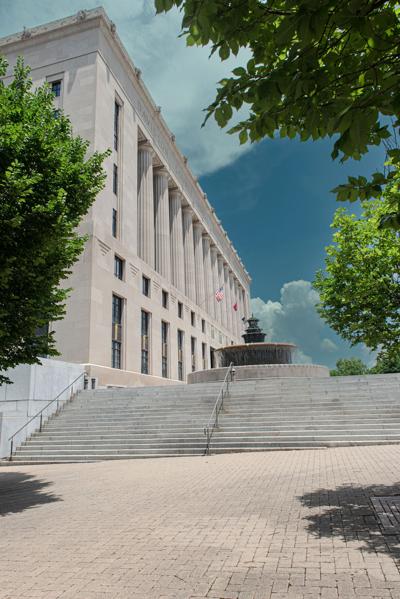
Metro Public Courthouse
After nearly a year of planning, a $600,000 marketing budget, more than 1,300 proposed projects and 60 days of voting, Nashville’s latest round of participatory budgeting has yielded 13,365 votes — well shy of the committee’s goal of 20,000. Metro’s online participatory budgeting voting system included a voluntary identification process, and the city has yet to determine whether all votes are valid. Additional votes cast at in-person ballot boxes around the city have yet to be tallied.
Speaking to media Friday morning, Mayor Freddie O’Connell suggested that the program failed to reach adequate levels of engagement and duplicated existing ways to secure neighborhood improvements.
“Even with hundreds of thousands of dollars in marketing, we are not seeing particularly heavy voting rates on participatory budgeting,” O’Connell told reporters. He recalled working through the yearly budget to secure local improvements as a district councilmember. “All of the things that I would have wanted in participatory budgeting, I had made sure were generally in the [Capital Improvements Budget]. And they were sourced from our neighborhoods in District 19.”
Participatory Budgeting Steering Committee chair Jason Sparks — who took over the position after Whitney Pastorek’s resignation in May — tells the Scene that the mayoral transition disrupted a project otherwise set up for success. Sparks says O’Connell’s decision not to keep Fabian Bedne, who had overseen the program under former Mayor John Cooper, and poor communication from the mayor’s office doomed outreach and engagement during the program’s rollout phase.
“Fabian did everything he could to give us a road map for the program before he left," says Sparks. "We had people who spoke Spanish, Arabic, Kurdish — the plan was to go out and engage those communities, to have voting expos, but none of that ever happened. When Fabian left, we started reaching out to the O’Connell administration, but I got no response. We were cornering Freddie at public events asking who would take over.”
O’Connell inherited the participatory budgeting program from Cooper, who dedicated staff and $10 million in one-time American Rescue Plan money to the effort. The Cooper administration characterized participatory budgeting as an exercise in citizen-led democracy that could directly deliver improvements to Nashville neighborhoods.
After two abrupt leadership departures, Metro's pricey experiment with direct neighborhood allocations nears finish line
Last winter, Bedne assembled a steering committee to guide the process, which included assembling an additional group of budget delegates. Budget delegates narrowed a pool of more than 1,300 proposed projects to a ballot of 35 proposals — one for each Metro Council district. The majority of projects would allocate funds for pedestrian safety measures, public park upgrades and improvements to Metro schools and libraries. The process parallels the Metro Council’s yearly Capital Improvements Budget, a catalog of citywide improvements that can then be funded by the mayor’s Capital Spending Plan.
The city has not yet released vote totals by ZIP code or by project. Sparks says the Participatory Budgeting Steering Committee has not had regular communication with the mayor’s office and struggled to get updates during the voting window. The mayor’s office confirmed that oversight of participatory budgeting had been assigned to Mary Jo Wiggins in the Metro Finance Department.
Wiggins has not responded to the Scene's request for comment. O'Connell says that he will review the process and discuss with councilmembers whether it makes sense for the mayor's office to continue supporting participatory budgeting.
“We worked really hard to put all this together with the guidelines we were handed,” says Sparks. “Eventually more than just five projects will get green-lit. We just could have connected with so many more people if the whole thing with Fabian hadn’t happened. I don’t think it was incompetence. It was just unfortunate timing.”
Votes will be tallied through December. The steering committee will then announce what projects get funded and implemented in 2024.
Correction: A previous version of this article stated that participatory budgeting voting was open for 30 days rather than 60. We apologize for the error.






